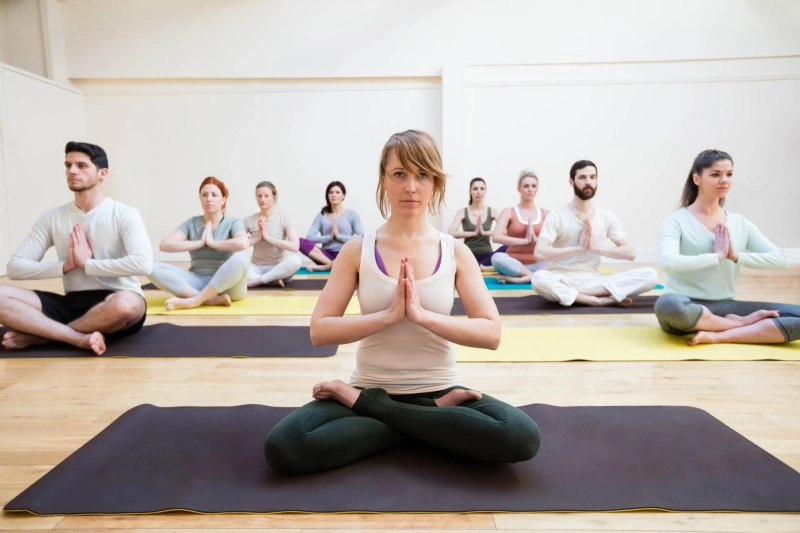Hatha Yoga is an ancient practice that has been passed down through generations, known for its physical postures, breathing techniques, and meditative focus. It is part of the broader tradition of Classical Yoga, which aims to harmonize the body, mind, and spirit. Hatha Yoga, often described as the foundation of most modern yoga styles, is particularly popular for its gentle approach that combines strength-building poses with mindfulness and relaxation. Whether you're looking to improve flexibility, reduce stress, or enhance your mental clarity, Hatha Yoga offers numerous benefits for both beginners and experienced practitioners. This article explores what is Hatha Yoga and highlights the benefits it offers to anyone looking to improve their overall well-being.
What is Hatha Yoga?
Hatha Yoga is a traditional form of yoga that focuses on physical postures (asanas), breathing exercises (pranayama), and meditation to balance and strengthen the body and mind. The word "Hatha" is derived from two Sanskrit words: "Ha" meaning sun, and "Tha" meaning moon, symbolizing the balancing of opposing energies within the body. Hatha Yoga seeks to align these energies, promoting a sense of balance, inner peace, and harmony.
While many people think of yoga as just stretching or meditation, Hatha Yoga incorporates a comprehensive approach that emphasizes not just flexibility but also strength, alignment, and breath awareness. It is a slower-paced practice compared to other yoga styles, making it accessible to beginners while still providing depth for more advanced practitioners.
Key Components of Hatha Yoga
- Asanas (Postures): These are the physical poses practiced in Hatha Yoga. Each asana is designed to stretch, strengthen, and align the body. Asanas help improve flexibility, build strength, and enhance balance. Some postures are simple and restorative, while others may be more challenging, requiring endurance and concentration.
- Pranayama (Breathing Techniques): Pranayama refers to the practice of controlled breathing. In Hatha Yoga, breath control is central to connecting with the body and calming the mind. Breathing exercises help to regulate energy (prana) in the body, reduce stress, and improve concentration.
- Meditation: Meditation is often practiced at the end of a Hatha Yoga session. It helps calm the nervous system, release mental tension, and increase mindfulness. By focusing on the breath or a specific object of attention, meditation fosters mental clarity, reduces stress, and improves emotional well-being.
Benefits of Hatha Yoga
- Improved Flexibility: One of the most well-known benefits of Hatha Yoga is its ability to improve flexibility. Through the consistent practice of various asanas, the body becomes more open, particularly in areas like the hips, back, and shoulders. This enhanced flexibility can help prevent injury and improve overall mobility.
- Reduced Stress and Anxiety: Hatha Yoga's combination of deep breathing and mindful movement helps activate the parasympathetic nervous system, which promotes relaxation. By focusing on the breath and being present in the moment, Hatha Yoga reduces cortisol levels (the stress hormone), leading to a calmer, more peaceful mind.
- Better Posture: Regular practice of Hatha Yoga encourages proper alignment, which leads to better posture. This is especially beneficial for those who spend long hours sitting at desks or engaging in repetitive movements. Improved posture can alleviate back pain and increase comfort throughout the day.
- Increased Strength and Balance: Holding various yoga poses strengthens different muscle groups, particularly the core, legs, and arms. Over time, practitioners develop increased strength and better balance. Hatha Yoga also improves proprioception, or the awareness of body position in space, which contributes to overall stability.
- Enhanced Mental Clarity: The practice of mindful movement and meditation in Hatha Yoga helps clear the mind, improve focus, and boost concentration. By quieting mental chatter, practitioners can achieve a state of mental clarity that enhances decision-making and creativity.
- Improved Circulation: The physical postures and breathing techniques of Hatha Yoga stimulate blood flow, increasing circulation throughout the body. Better circulation supports the body's detoxification process and improves oxygen delivery to tissues, promoting overall health.
- Better Sleep: Many Hatha Yoga practitioners report improved sleep quality. The calming effects of Hatha Yoga help relax both the body and mind, making it easier to fall asleep and enjoy a deeper, more restful night’s sleep.
Finding Hatha Yoga Near You
If you are interested in experiencing the many benefits of Hatha Yoga, searching for Hatha Yoga Near You is a great way to find local classes or instructors. Many yoga studios offer classes for all levels, whether you're just starting out or looking to deepen your practice. Joining a class can provide you with structure, guidance, and community, enhancing your yoga journey.
Hatha Yoga: A Path to Balance and Well-being
Hatha Yoga, as part of Classical Yoga, offers a timeless and holistic approach to physical and mental health. It provides not only a method for improving physical strength, flexibility, and posture but also fosters emotional balance and mental clarity. Whether you’re looking to reduce stress, improve flexibility, or simply become more in tune with your body and mind, Hatha Yoga is a valuable practice that offers lasting benefits.
Incorporating Hatha Yoga into your daily or weekly routine can help you achieve a deeper sense of balance, improve overall health, and lead to a more mindful, peaceful life.


